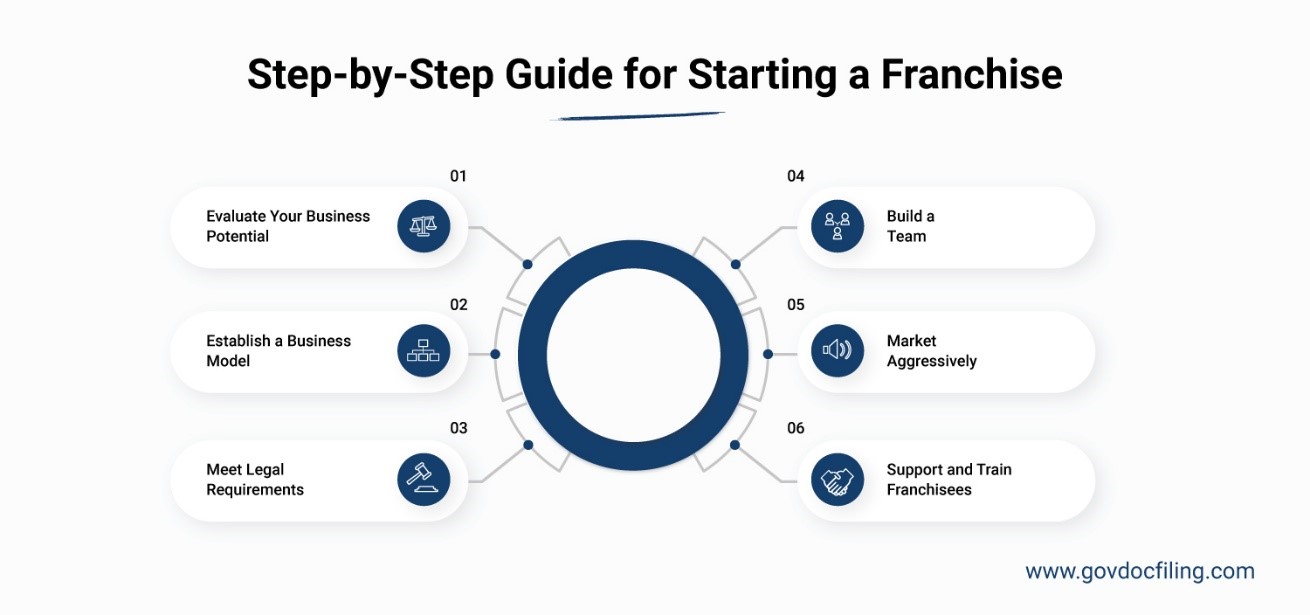How To Open Your Business For Franchise

For entrepreneurs looking to expand their brand's reach, franchising offers a compelling pathway to growth. However, transitioning from a single successful business to a franchise model requires careful planning, legal compliance, and strategic execution. Here's a detailed look at the key steps involved in opening your business for franchise opportunities.
Turning a successful independent business into a franchise system is a complex process. This undertaking involves legal compliance, operational restructuring, and brand standardization.
Assessing Franchise Suitability
Before diving into the complexities of franchising, it’s crucial to honestly assess whether your business is suitable for this model. A profitable business isn't enough; it needs to be replicable.
Does your business model rely heavily on a single individual's skills, or can it be easily taught and duplicated by others? Strong brand recognition and a proven track record are also essential.
Key Considerations:
- Profitability and Sustainability: Is the business model consistently profitable and likely to remain so?
- Replicability: Can the business operations be easily standardized and taught to franchisees?
- Brand Strength: Does the brand have strong recognition and a positive reputation?
- Market Demand: Is there sufficient demand for the product or service in multiple locations?
Developing the Franchise System
Creating a robust franchise system is the most crucial part of the process. This involves documenting every aspect of the business, from operations to marketing, and developing comprehensive training programs.
This is also the stage where you decide on the franchise fee, royalties, and other financial terms.
Franchise Operations Manual:
A detailed manual outlining every aspect of the business, from daily operations to customer service protocols, is vital. This manual should provide clear and concise instructions that franchisees can easily follow.
Training Programs:
Comprehensive training programs are essential to ensure that franchisees can successfully operate the business. These programs should cover all aspects of the business, including operations, marketing, and customer service.
Financial Structure:
Determining the appropriate franchise fee, royalties, and other financial terms is crucial for both the franchisor and the franchisee. Seek expert advice to ensure that the financial structure is fair and sustainable.
Legal Compliance: The Franchise Disclosure Document (FDD)
In many countries, including the United States, you must comply with franchise laws and regulations. The centerpiece of this compliance is the Franchise Disclosure Document (FDD).
The FDD provides potential franchisees with detailed information about the franchise opportunity. This document must be presented to potential franchisees at least 14 days before they sign any agreement or pay any fees.
FDD Contents:
The FDD typically includes information about the franchisor's background, financial performance, litigation history, and obligations. It also details the franchisee's obligations, fees, and termination rights.
Recruiting and Selecting Franchisees
Finding the right franchisees is crucial for the success of the franchise system. Develop a comprehensive recruitment strategy to attract qualified candidates.
Carefully screen potential franchisees to ensure they have the necessary skills, experience, and financial resources to succeed.
Franchise Agreement:
A well-drafted franchise agreement is essential to protect both the franchisor and the franchisee. This agreement should clearly define the rights and obligations of both parties, including the term of the agreement, territory rights, and termination provisions.
Ongoing Support and Monitoring
Providing ongoing support and monitoring is crucial to ensure the success of the franchise system. Regular communication, training updates, and performance evaluations are essential.
Establish systems for monitoring franchisee performance and addressing any issues that may arise promptly.
Technology and Innovation:
Franchisors must continue to innovate and adapt to changing market conditions. This may involve investing in new technologies, developing new products or services, and adapting marketing strategies.
Conclusion
Opening your business for franchise requires a substantial investment of time, resources, and expertise. It is beneficial to consult with experienced franchise consultants and attorneys.
By carefully planning and executing each step, businesses can successfully leverage the franchise model to expand their reach and build a strong, sustainable brand. The International Franchise Association (IFA) offers resources and support for those considering franchising.


















